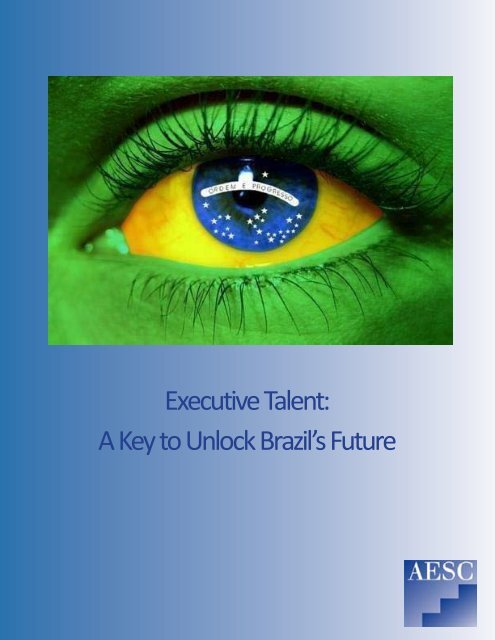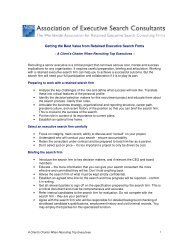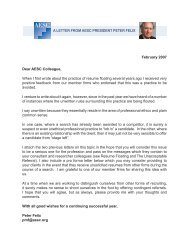Executive Talent: A Key to Unlock Brazil's Future - The Association ...
Executive Talent: A Key to Unlock Brazil's Future - The Association ...
Executive Talent: A Key to Unlock Brazil's Future - The Association ...
You also want an ePaper? Increase the reach of your titles
YUMPU automatically turns print PDFs into web optimized ePapers that Google loves.
<strong>Executive</strong> <strong>Talent</strong>:<br />
A <strong>Key</strong> <strong>to</strong> <strong>Unlock</strong> Brazil’s <strong>Future</strong>
<strong>Executive</strong> <strong>Talent</strong>: A <strong>Key</strong> <strong>to</strong> <strong>Unlock</strong> Brazil’s <strong>Future</strong><br />
2. Introduction from the <strong>Association</strong> of <strong>Executive</strong> Search Consultants<br />
3. <strong>Key</strong> Trends<br />
4. Overview of the Brazilian Growth S<strong>to</strong>ry<br />
5. A Dire <strong>Talent</strong> Shortage<br />
7. A Changing View of Business Practices and Corporate Governance<br />
8. Looking Outside the Borders for Growth<br />
9. Examining the Cultural Aspects of the Brazilian Workplace<br />
11. Conclusions<br />
12. About the <strong>Association</strong> of <strong>Executive</strong> Search Consultants<br />
13. AESC Members in Brazil
INTRODUCTION FROM THE AESC<br />
“Competition for <strong>to</strong>p performers<br />
has never been more intense,<br />
nor has the recruitment of that<br />
talent ever required more<br />
professionalism and skill.”<br />
<strong>The</strong> growth trajec<strong>to</strong>ry of the Brazilian economy, remarkable as it has been, has presented an acute set of<br />
challenges for our member firms and their clients. Competition for <strong>to</strong>p performers has never been more<br />
intense, nor has the recruitment of that talent ever required more professionalism and skill.<br />
<strong>Executive</strong> search consultants <strong>to</strong>day are providing their clients with value added services across the human<br />
resources spectrum – identifying, recruiting, retaining and developing leaders that will lead the best<br />
companies in<strong>to</strong> their next stage of growth.<br />
This paper focuses on Brazil and attempts <strong>to</strong> illuminate the critical nature of senior executive talent <strong>to</strong> the<br />
growth trajec<strong>to</strong>ry of Brazilian enterprises and the Brazilian economy at large.<br />
As the worldwide professional association for retained executive search consulting firms, the AESC is committed<br />
<strong>to</strong> promoting best practices in our profession and <strong>to</strong> helping Brazilian organizations achieve their<br />
best value from this specialized form of management consulting.<br />
Peter M. Felix, CBE<br />
President, <strong>Association</strong> of <strong>Executive</strong> Search Consultants<br />
12 East 41st Street,<br />
New York, NY 10017<br />
pmf@aesc.org<br />
+1 212-398-9556 x225
KEY TRENDS<br />
<strong>The</strong> Brazilian economy experienced real GDP growth over 5% in 2009 and is on pace <strong>to</strong> well exceed that<br />
rate in 2010. <strong>The</strong> continuation of this growth trajec<strong>to</strong>ry will hinge on how Brazilian enterprise addresses<br />
the following:<br />
• <strong>The</strong>re is an acute shortage of executive leadership talent. <strong>The</strong> neglect of the public educational system<br />
and flight of the best talent <strong>to</strong> opportunities abroad over the last thirty years has left Brazilian organizations<br />
with a leadership pool insufficient <strong>to</strong> meet <strong>to</strong>day’s requirements.<br />
• Existing corporate governance structures are weak compared <strong>to</strong> developed economies. <strong>The</strong> willingness<br />
and ability of enterprise <strong>to</strong> improve corporate governance, and the talent with the perspective<br />
<strong>to</strong> develop and implement it, will play a central role in Brazil’s transition from a nation of family businesses<br />
<strong>to</strong> a nation of large public enterprises.<br />
• Brazilian firms that seek <strong>to</strong> maximize growth for their shareholders are looking for opportunities<br />
abroad and seeking the talent necessary <strong>to</strong> capture these opportunities. <strong>The</strong> pool of leaders residing<br />
in Brazil with the skills and experience <strong>to</strong> drive international expansion is limited.<br />
• Brazilian culture has long been intertwined with the workplace. Today, Generation Y is creating a new<br />
cultural shift that is having a profound effect on Brazilian enterprise. <strong>The</strong> extent <strong>to</strong> which Brazilian employers<br />
address the unique demands of Generation Y will directly affect their ability <strong>to</strong> compete.
OVERVIEW OF THE BRAZILIAN GROWTH STORY<br />
While not left unscathed by the global financial crisis, Brazil was and continues <strong>to</strong> be the engine fueling<br />
the economy of Latin America. <strong>The</strong> awarding of the 2016 Summer Olympic Games <strong>to</strong> Rio de Janeiro was,<br />
in many ways, in recognition of Brazil’s economic success.<br />
Brazil was not long ago a primarily agricultural economy, driven in large part by commodities such as coffee<br />
and soya beans. Family businesses were the norm and talent was appointed from within the family,<br />
often leaving bright talent without a path <strong>to</strong> advancement. Performance management, if implemented,<br />
was not respected as a <strong>to</strong>ol <strong>to</strong> promote the highest potential talent and thus diversity suffered as families<br />
looked <strong>to</strong> protect their stature and wealth.<br />
In the late 1980s and early 1990s, Brazil developed in<strong>to</strong> a major manufacturing hub servicing au<strong>to</strong>makers,<br />
white good manufacturers and other value added industries. In the late 1990’s, the U.S. began <strong>to</strong> look<br />
more and more at Brazil, and particularly Sao Paolo, as a financial hub in Latin America.<br />
In the wake of the global financial crisis, Brazil’s largest financial institutions have fared well. Brazilian<br />
financial institutions did not face the same turmoil as their counterparts in the U.S. and have benefited<br />
from strong balance sheets and appreciation of the Brazilian Real against the U.S. Dollar. Today, a growing<br />
middle class, strong commodity markets, and skyrocketing trade with China, is fueling Brazilian firms’<br />
global expansion. Some 27.8 million Brazilians — out of a population of nearly 200 million — joined the<br />
consumer economy from Oc<strong>to</strong>ber 2003 <strong>to</strong> Oc<strong>to</strong>ber 2008. Further, the Chinese continuous thirst for commodities,<br />
particularly soybeans, iron ore and oil, has been critical. “I don’t know where we’d be without<br />
China,” said Jose Augus<strong>to</strong> de Castro, a vice president of the Rio-based Brazilian Foreign Trade <strong>Association</strong>. i<br />
In addition, foreign direct investment is pouring in<strong>to</strong> the economy and providing firms with the capital required<br />
<strong>to</strong> even more rapidly expand beyond national borders. Since Oc<strong>to</strong>ber 2009, there have been eight<br />
transactions involving the purchase of U.S. assets by Brazilian firms. JBS, a Brazilian meatpacker, acquired<br />
U.S. firm, Pilgrim’s Pride, at the end of 2009 followed by another U.S. firm, Swift, in January 2010. Later<br />
in January, Petrobras bought a large stake in the Gulf of Mexico’s Cascade Oil Field. In February, Braskem,<br />
a Brazilian resin producer, acquired part of Sunoco Chemicals and in April, Banco do Brasil, received approval<br />
from the U.S. Federal Reserve <strong>to</strong> open up retail operations in the United States. Most recently, in<br />
June 2010, Marfig, a Brazilian meat packer, acquired the U.S. firm <strong>Key</strong>s<strong>to</strong>ne Foods, establishing itself as a<br />
key supplier <strong>to</strong> fast food chains like Subway and McDonald’s. ii<br />
This rapid expansion, while a boon <strong>to</strong> the Brazilian economy, has exacerbated an already acute talent<br />
shortage, highlighted the need for improved corporate governance, demanded that firms incorporate a<br />
new global perspective, and required the reconsideration of certain cultural norms. <strong>The</strong>se challenges will<br />
be addressed in the following four sections.
A DIRE TALENT SHORTAGE<br />
While the Brazilian economy has grown significantly, the nation’s educational system has not kept pace<br />
and Brazilian enterprise is stressed <strong>to</strong> identify, recruit, develop, and retain necessary talent. Brazilian<br />
students consistently rank academically below their peers in other countries, thus entry level talent is<br />
under-skilled and faces challenges as it develops in<strong>to</strong> management – slowing the growth of individual<br />
enterprises and national GDP. iii<br />
According <strong>to</strong> a recent survey of 35,000 employers across 36 countries released this year, 64 percent of<br />
employers in Brazil indicated difficulty filling positions in their organizations. This was more than twice<br />
the global average and placed Brazil second only <strong>to</strong> Japan as the most difficult country in which <strong>to</strong> fill a<br />
position. Only 14 percent of employers in the United States noted difficulty filling positions. iv<br />
Brazil’s education system is sorely lacking. While the upper classes are often educated overseas or in a<br />
small number of elite universities, half of Latin America’s illiterate population lives in Brazil. Twenty percent<br />
of Brazilians are completely unable <strong>to</strong> read. More than half of all Brazilian children have never gone<br />
<strong>to</strong> school at all. v<br />
In contrast <strong>to</strong> Brazil’s neglect of its educational system, India has had a decades old emphasis on the development<br />
of its secondary schools and universities. Employing a different strategy but with similar focus,<br />
China has traditionally identified <strong>to</strong>p performing students at an early age and provided educational opportunities<br />
abroad for its best and brightest. Notwithstanding economic growth even more rapid than in<br />
Brazil, only 16 percent of employers in India reported difficulty filling positions and 40 percent of employers<br />
in China reported such difficulty. vi<br />
Brazilian firms are forced <strong>to</strong> pick up the slack left by a poor educational system. Given the dearth of suitable<br />
talent, employers have reluctantly become the source of secondary education for many of their employees.<br />
However, the capacity <strong>to</strong> train talent during employment simply is dwarfed by the rate of promotion<br />
necessary <strong>to</strong> keep pace with business demands.<br />
Many firms are taking a gamble on younger talent, more likely <strong>to</strong> be educated abroad or exposed <strong>to</strong> international<br />
standards of business. However, leadership and skills development takes time. <strong>The</strong> fast tracking<br />
of young talent, whose management experience does not match their technical acumen, presents risks<br />
and places additional requirements on employers.<br />
“<strong>The</strong> problem is that universities in Brazil <strong>to</strong>day are able <strong>to</strong> train about 30,000 engineers annually, and<br />
only a subset have management capabilities. In contrast, South Korean universities produce 80,000<br />
engineers annually, India universities produce 250,000 engineers annually, and Chinese universities<br />
produce 400,000 engineers annually. Brazil does not have enough engineers, and certainly not enough<br />
engineers who will develop in<strong>to</strong> managers,” noted one leading executive search consultant.
A DIRE TALENT SHORTAGE continued...<br />
Many of Brazil’s <strong>to</strong>p graduates over the past two decades have been recruited <strong>to</strong> the U.S. and other developed<br />
markets. Marcio Ponchman, a noted Brazilian economist, conducted a study in 2006 in which he<br />
found that 140,000 <strong>to</strong> 160,000 Brazilian degree holders left the country each year for professional opportunities<br />
abroad. vii<br />
Had these individuals remained they would <strong>to</strong>day be leading the nation’s enterprises. Instead, many of<br />
these executives are now well rooted in their adopted countries and don’t intend <strong>to</strong> return <strong>to</strong> Brazil during<br />
their working life.<br />
As one search consultant shared, “We exported talent and are now short of executive talent. <strong>The</strong> years<br />
of turmoil in the Brazilian economy drove many <strong>to</strong> developed markets. Like football where our best<br />
players are spread around the world, attracted by the dollars and increased reputation, we continue <strong>to</strong><br />
export our executives.”<br />
Those that remained in Brazil and now sit a<strong>to</strong>p Brazilian enterprise are having difficulty finding successors.<br />
According <strong>to</strong> one recent study of 1200 Brazilian executives, 85 percent said they lacked talent with<br />
the necessary qualifications <strong>to</strong> be promoted <strong>to</strong> leadership within their company, and 70 percent said they<br />
lacked a competent successor for their own role. viii<br />
<strong>The</strong> shortage of suitable talent in Brazil is not showing any signs of subsiding. Qualified people <strong>to</strong> fill key<br />
roles are only becoming scarcer as the most experienced executives are retiring and the professional demands<br />
of fast growing organizations increase. Retained executive search consultants are well positioned<br />
<strong>to</strong> assist Brazilian firms with the battle for scarce talent, providing their clients a tailored service and<br />
unique competitive advantage.
A CHANGING VIEW OF BUSINESS PRACTICES AND<br />
CORPORATE GOVERNANCE<br />
Brazilian enterprise, working cooperatively with regula<strong>to</strong>ry authorities, has made great strides <strong>to</strong>ward<br />
improved corporate governance. Implementation of robust practices is a challenge in a market dominated<br />
by family owned companies where many shareholders – up <strong>to</strong> 2/3 in many companies – hold preferred<br />
shares carrying no voting rights. In 2001, companies were limited <strong>to</strong> issuing 50% of their s<strong>to</strong>ck in preferred<br />
shares, but existing listed enterprises were permitted <strong>to</strong> remain under the old more lenient regula<strong>to</strong>ry<br />
cap.<br />
As a consequence, control of many companies in Brazil remains with a small number of shareholders. In<br />
fact, over 60 percent of publicly listed companies in Brazil have one shareholder who controls over 50<br />
percent of voting shares. Majority shareholders often disregard the interests of minority shareholders<br />
and Boards of Direc<strong>to</strong>rs are often controlled almost entirely by insiders or representatives of the majority<br />
shareholders. ix<br />
While quarterly financial statements and other reports generally required in developed markets are not<br />
yet mandated, regula<strong>to</strong>ry reforms are expected <strong>to</strong> bring Brazil in compliance with international standards<br />
by the end of 2010. Today, audit committees remain relatively uncommon or controlled by the majority<br />
shareholder, though some firms are establishing permanent fiscal boards <strong>to</strong> review their books and<br />
records.<br />
Brazil has made significant advances, particularly in the last decade, as entrepreneurs and senior executives<br />
have come <strong>to</strong> recognize the value of investing in corporate governance. Increasing foreign investment<br />
interest in Brazil will incentivize management <strong>to</strong> modernize corporate governance procedures and<br />
policies. “<strong>The</strong>re is an important movement of foreign private equity firms <strong>to</strong> enter the Brazilian market,”<br />
noted Luiz Eugenio Figueiredo, President of the ABVCAP – Brazil’s Private Equity <strong>Association</strong>. “I think<br />
it’s very good because they are bringing international standards and practices <strong>to</strong> the market.” x<br />
This new way of doing business in Brazil is already proving <strong>to</strong> increase the competitiveness of the early<br />
adopters of robust corporate governance policies. In fact, modern corporate governance policies are becoming<br />
an important differentia<strong>to</strong>r for talent weighing the merits of various employment opportunities.<br />
Firms that showcase good corporate governance in the recruitment process will naturally attract talent<br />
that will seek <strong>to</strong> reinforce and improve corporate governance. Retained executive search consultants with<br />
an understanding of corporate governance and experience presenting that understanding <strong>to</strong> candidates<br />
are critical <strong>to</strong> attracting this talent.
LOOKING OUTSIDE THE BORDERS FOR GROWTH<br />
Brazilian firms that aim <strong>to</strong> maximize returns <strong>to</strong> shareholders cannot ignore markets outside their national<br />
borders. While the Brazilian consumer continues <strong>to</strong> provide a healthy base of revenues, Brazilian firms<br />
are looking <strong>to</strong> sell their products and services in other emerging economies, most notably in China. Brazil<br />
exported USD10.64 billion of goods (15 percent of <strong>to</strong>tal exports) <strong>to</strong> China in the first five months of 2010;<br />
making China the single largest destination for Brazilian goods. xi<br />
With trade barriers decreasing and the spending power of international consumers increasing, the lack<br />
of leadership talent is the primary obstacle <strong>to</strong> capturing opportunities in international markets. xii Brazilian<br />
firms that identify and develop leaders with foreign language skills and<br />
a global perspective – talent able <strong>to</strong> adjust strategies and models <strong>to</strong><br />
markets beyond Brazil’s borders and manage teams in culturally diverse<br />
environments – will catapult ahead of the competition.<br />
Most multinational firms in Brazil offer foreign assignments <strong>to</strong> their<br />
high potential and management talent. Whereas the most highly motivated<br />
talent – that considers itself globally mobile – would once have<br />
only considered working for a U.S. or European multinational company,<br />
<strong>to</strong>day that talent is looking at careers in Brazil’s leading enterprises.<br />
This <strong>to</strong>p talent will be leading Brazilian enterprises in<strong>to</strong> international<br />
markets.<br />
“<strong>The</strong> leaders of global companies have his<strong>to</strong>rically been from the UK<br />
and USA, and soon it’s going <strong>to</strong> be China, Brazil, India or Russia,” noted Keith Dugdale, Direc<strong>to</strong>r of Global<br />
Recruitment at KPMG. xiii<br />
Given the diaspora of Brazilian executives across the globe and the benefit of experience in local markets,<br />
the talent that will lead Brazilian enterprise abroad will not necessarily be found in Sao Paolo or Rio de<br />
Janeiro. Identifying and developing talent with the capability and a desire <strong>to</strong> shepherd the organization<br />
beyond Brazil’s borders often requires a global search by retained executive search professionals with access<br />
<strong>to</strong> BlueSteps or another global network who are trained at recognizing talent in different cultures.
EXAMINING THE CULTURAL ASPECTS OF THE<br />
BRAZILIAN WORKPLACE<br />
Brazilian enterprise is tightly intertwined with the nation’s distinct and strong cultural framework. Progressive<br />
human resources executives have long recognized the cultural underpinnings that influence the<br />
Brazilian workplace. Class stratification, loyalty <strong>to</strong> family, and strong gender identification, along with well<br />
defined racial, ethnic, and regional stereotypes, have traditionally influenced roles and professional assignments.<br />
However, <strong>to</strong>day, a new group with a distinct cultural identification – Generation Y – is presenting employers<br />
in Brazil with challenges not previously confronted. Generation Y is most often defined as individuals<br />
born between 1981 and 2001; a group of young professionals known <strong>to</strong> have a vastly different vision of<br />
employment than their older colleagues. As a group, Generation Y employees expect flexible work schedules,<br />
increased training programs, state of the art technology, decreased hierarchy, and higher pay. <strong>The</strong>y<br />
are known <strong>to</strong> lack loyalty <strong>to</strong> any one employer – believing that their managers should be grateful <strong>to</strong> have<br />
them on the workforce and perceiving that another job with equal or better benefits is always available<br />
for the taking.<br />
In fact, Generation Y’s perception is quite accurate in Brazil. Today, given the shortage of senior level<br />
executives, the <strong>to</strong>p talent in Generation Y is in very high demand. However, employers have been slow <strong>to</strong><br />
provide a workplace that meets the expectations of this generation – leading <strong>to</strong> challenges in the recruitment<br />
and retention of this business critical segment of the workforce.<br />
“<strong>The</strong>re is a ‘tale of two mindsets’ when it comes <strong>to</strong> understanding which employee groups are leaving<br />
and why they seek <strong>to</strong> leave.” Research from consulting firm Deloitte and Touche indicates that “corporate<br />
leaders often fail <strong>to</strong> understand the non-financial priorities of their employees. . . .” xiv<br />
As one Brazilian search consultant stated, “Understanding how <strong>to</strong> retain the talents of the new generation,<br />
maintaining a stable workforce and understanding trends leading <strong>to</strong> future generations are still<br />
the great challenges and goals of managing people in Brazil.”<br />
One Brazilian entrepreneur recognized the need <strong>to</strong> provide a new type of workplace over 25 years ago –<br />
and <strong>to</strong>day his firm, Semco, serves as a model of what Generation Y seeks in an employer. Semco, <strong>to</strong>day<br />
a Brazilian conglomerate with 3000 employees and US$212 million in annual revenues under the leadership<br />
of Richard Semler, was once a small engineering firm. Semco is guided by the principle, “if you want<br />
creative employees, don’t smother them.” He challenges everything about traditional workplaces and<br />
provides his employees with what he calls a “democratic workplace” where managers work at the behest<br />
of the teams they manage.<br />
Semler asks, “Why should employees feel compelled <strong>to</strong> read their emails on Sunday evening, but can’t<br />
go <strong>to</strong> the movies on Monday afternoon? Why should they take work home, but can’t bring their kids <strong>to</strong><br />
the office?” xv
EXAMINING THE CULTURAL ASPECTS OF THE<br />
BRAZILIAN WORKPLACE continued...<br />
While some of Semler’s ideas may be difficult for traditional companies <strong>to</strong> incorporate, there is no question<br />
that he has created an employee value proposition that has consistently attracted and retained <strong>to</strong>p<br />
talent. <strong>The</strong> Semco workplace is just the sort of workplace that attracts Generation Y – a generation that is<br />
changing the culture of the Brazilian workplace and placing a premium on employment that offers personal<br />
freedom.<br />
Brazilian enterprise is slowly shifting its policies <strong>to</strong> be more attractive <strong>to</strong> this new generation of employees.<br />
Retained executive search consultants with experience guiding cultural reforms in peer organizations,<br />
particularly reforms that create more democratic and flexible workplaces, are a valuable asset for firms<br />
looking <strong>to</strong> implement changes that will attract this new generation of talent.
CONCLUSIONS<br />
Brazil, propelled by the success of its homegrown enterprises, is poised <strong>to</strong> make the transition from a<br />
developing <strong>to</strong> a developed nation.<br />
Scarce high potential talent must be recruited and retained by Brazilian enterprises. As these enterprises<br />
implement more stringent corporate governance policies and procedures, they will attract increased<br />
foreign investment. Foreign direct investment will provide the resources required <strong>to</strong> expand in<strong>to</strong> international<br />
markets which, in turn, will increase the demands on scarce talent. To recruit and retain that scarce<br />
talent, employers must develop workplace environments attractive <strong>to</strong> <strong>to</strong>day’s employees.<br />
<strong>Talent</strong> is at the center of each of these transitions. Qualified retained executive search consultants are<br />
poised <strong>to</strong> assist Brazil’s leading enterprises with identifying, recruiting, developing and retaining this talent.<br />
i “Brazil’s Growing Middle Class Powers Country’s Economic Rebound,” Tyler Bridges, McClatchy Newspapers, August 2, 2009.<br />
ii “Say Bom Dia <strong>to</strong> Brazilian Business: <strong>The</strong>ir economy is strong, and they’re buying U.S. companies,” Newsweek, June 18, 2010.<br />
iii “<strong>The</strong> High Cost of Low Educational Performance: <strong>The</strong> Long-Run Economic Impact of Improving PISA Outcomes,” OECD 2010.<br />
iv “Supply/Demand: 2010 <strong>Talent</strong> Shortage Survey Results,” Manpower, 2010.<br />
v “Brazil, Doing Business In,” David A. Vic<strong>to</strong>r, Encyclopedia of Business, 2nd edition.<br />
vi “Supply/Demand: 2010 <strong>Talent</strong> Shortage Survey Results,” Manpower, 2010.<br />
vii “Brazil’s Brain Drain,” Barbara Axt, <strong>The</strong> Guardian, September 12, 2007.<br />
viii Kienbaum Press Release, December 24, 2009.<br />
ix “Corporate Governance in International Business,” Professor S. Donald Gonson, April 2009.<br />
x “Brazil Attracts Private Equity from Overseas,” Spencer Andreson, FT Mandate, April 2009.<br />
xi “Brazil Exports <strong>to</strong> Benefit from China Yuan Policy Change, Luiz Pereira Says,” Laura Price, Bloomberg, June 24, 2010.<br />
xii “<strong>The</strong> Evolving Global <strong>Talent</strong> Pool: Lessons from the BRICs Countries,” <strong>The</strong> Levin Institute of the State University of New York, 2010.<br />
xiii “Global <strong>Talent</strong>,” Economist Intelligence Unit and UK Trade and Investment, 2010.<br />
xiv “Talking About Whose Generation? Why Western generational models can’t account for a global workplace,” David Hole, Le Zhong, and<br />
Jeff Schwartz, Deloitte Review, 2010.<br />
xv “<strong>The</strong> Boss Who Breaks All the Rules,” Dominique Haijtema, Ode Magazine, January/February 2010.
ABOUT THE ASSOCIATION OF EXECUTIVE<br />
SEARCH CONSULTANTS<br />
<strong>The</strong> <strong>Association</strong> of <strong>Executive</strong> Search Consultants (AESC) is the worldwide professional association for retained<br />
executive search consulting firms. <strong>The</strong> AESC promotes the highest professional standards in executive<br />
search through its industry recognized Code of Ethics and Professional Practice Guidelines. <strong>The</strong> AESC<br />
also serves <strong>to</strong> broaden public understanding of the executive search process and acts as an advocate for<br />
the interests of its member firms.<br />
<strong>The</strong> AESC also provides BlueSteps.com, a career management service for senior executives, and CorporateConnect<br />
- at www.executivesearchconnect.com - a service for Human Resources professionals offering<br />
search industry information and access <strong>to</strong> the AESC membership direc<strong>to</strong>ry.
AESC MEMBERS IN BRAZIL<br />
Abrahams & Associates – www.abrahams.com.br<br />
Amrop Panelli Motta Cabrera – www.pmcamrop.com.br<br />
Boyden - www.boyden.com<br />
CTPartners – www.ctnet.com<br />
Dasein <strong>Executive</strong> Search - www.dasein.com.br<br />
Fesa Global <strong>Executive</strong> Search Transforming Leadership – www.fesa.com.br<br />
Grace Company <strong>Executive</strong> Search – www.gracecompany.com.br<br />
Heidrick & Struggles – www.heidrick.com<br />
Korn/Ferry International – www.kornferry.com<br />
MP Sampaio Consul<strong>to</strong>res/Penrhyn International – www.penrhyn.com<br />
Odgers Berndtson - www.odgersberndtson.com.br<br />
Russell Reynolds Associates, Inc. - www.russellreynolds.com<br />
Signium International – www.signium.com.br<br />
Spencer Stuart – www.spencerstuart.com<br />
Stan<strong>to</strong>n Chase International – www.stan<strong>to</strong>nchase.com<br />
TRANSEARCH – www.transearch.com.br







